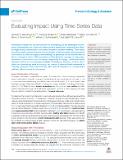Files in this item
Evaluating impact using time-series data
Item metadata
| dc.contributor.author | Wauchope, Hannah S. | |
| dc.contributor.author | Amano, Tatsuya | |
| dc.contributor.author | Geldmann, Jonas | |
| dc.contributor.author | Johnston, Alison | |
| dc.contributor.author | Simmons, Benno | |
| dc.contributor.author | Sutherland, William J. | |
| dc.contributor.author | Jones, Julia P. G. | |
| dc.date.accessioned | 2021-11-25T13:30:07Z | |
| dc.date.available | 2021-11-25T13:30:07Z | |
| dc.date.issued | 2021-03 | |
| dc.identifier | 276797039 | |
| dc.identifier | b902ffcb-6d70-45e1-b200-9fa3f2e12ecf | |
| dc.identifier | 000617299900008 | |
| dc.identifier | 85097764229 | |
| dc.identifier.citation | Wauchope , H S , Amano , T , Geldmann , J , Johnston , A , Simmons , B , Sutherland , W J & Jones , J P G 2021 , ' Evaluating impact using time-series data ' , Trends in Ecology & Evolution , vol. 36 , no. 3 , pp. 196-205 . https://doi.org/10.1016/j.tree.2020.11.001 | en |
| dc.identifier.issn | 0169-5347 | |
| dc.identifier.uri | https://hdl.handle.net/10023/24397 | |
| dc.description | H.S.W. was supported by the Cambridge Trust Poynton Scholarship, Cambridge Department of Zoology J.S. Gardiner Studentship, and Cambridge Philosophical Society; T.A. was supported by the Australian Research Council Future Fellowship (FT180100354), and the University of Queensland strategic funding; J.G. was supported by European Union’s Horizon 2020 Marie Skłodowska-Curie program (No. 706784), and VILLUM FONDEN (VKR023371); B.I.S. was supported by a Royal Commission for the Exhibition of 1851 Research Fellowship; W.J.S. is funded by Arcadia and J.P.G.J. was supported by the Leverhulme Trust: RPG-2014-056. | en |
| dc.description.abstract | Humanity's impact on the environment is increasing, as are strategies to conserve biodiversity, but a lack of understanding about how interventions affect ecological and conservation outcomes hampers decision-making. Time series are often used to assess impacts, but ecologists tend to compare average values from before to after an impact; overlooking the potential for the intervention to elicit a change in trend. Without methods that allow for a range of responses, erroneous conclusions can be drawn, especially for large, multi-time-series datasets, which are increasingly available. Drawing on literature in other disciplines and pioneering work in ecology, we present a standardised framework to robustly assesses how interventions, like natural disasters or conservation policies, affect ecological time series. | |
| dc.format.extent | 10 | |
| dc.format.extent | 1717382 | |
| dc.language.iso | eng | |
| dc.relation.ispartof | Trends in Ecology & Evolution | en |
| dc.subject | Before-after-control-intervention | en |
| dc.subject | Longitudinal data | en |
| dc.subject | Counterfactual | en |
| dc.subject | Interrupted time series | en |
| dc.subject | Causal inference | en |
| dc.subject | Difference in differences | en |
| dc.subject | GE Environmental Sciences | en |
| dc.subject | QA Mathematics | en |
| dc.subject | QH301 Biology | en |
| dc.subject.lcc | GE | en |
| dc.subject.lcc | QA | en |
| dc.subject.lcc | QH301 | en |
| dc.title | Evaluating impact using time-series data | en |
| dc.type | Journal item | en |
| dc.contributor.institution | University of St Andrews. Statistics | en |
| dc.contributor.institution | University of St Andrews. Centre for Research into Ecological & Environmental Modelling | en |
| dc.identifier.doi | 10.1016/j.tree.2020.11.001 | |
| dc.description.status | Peer reviewed | en |
This item appears in the following Collection(s)
Items in the St Andrews Research Repository are protected by copyright, with all rights reserved, unless otherwise indicated.

